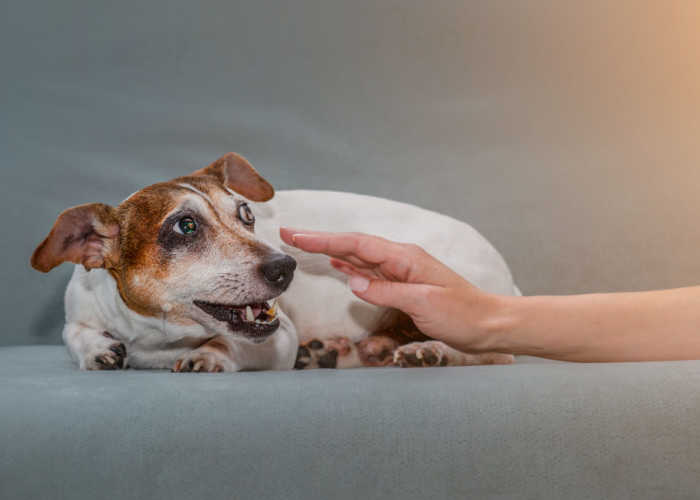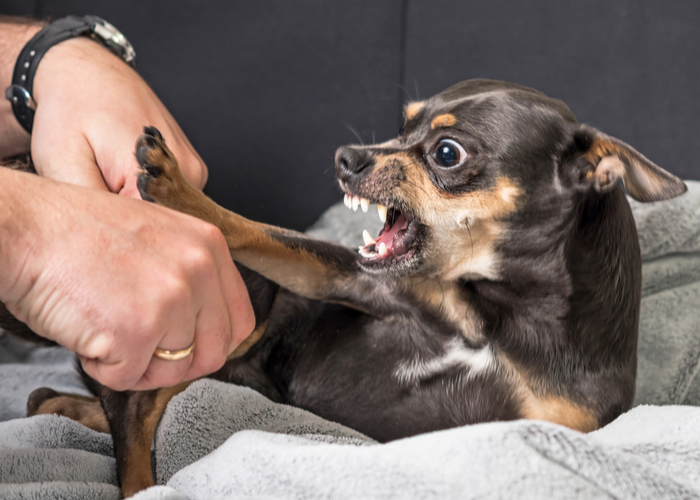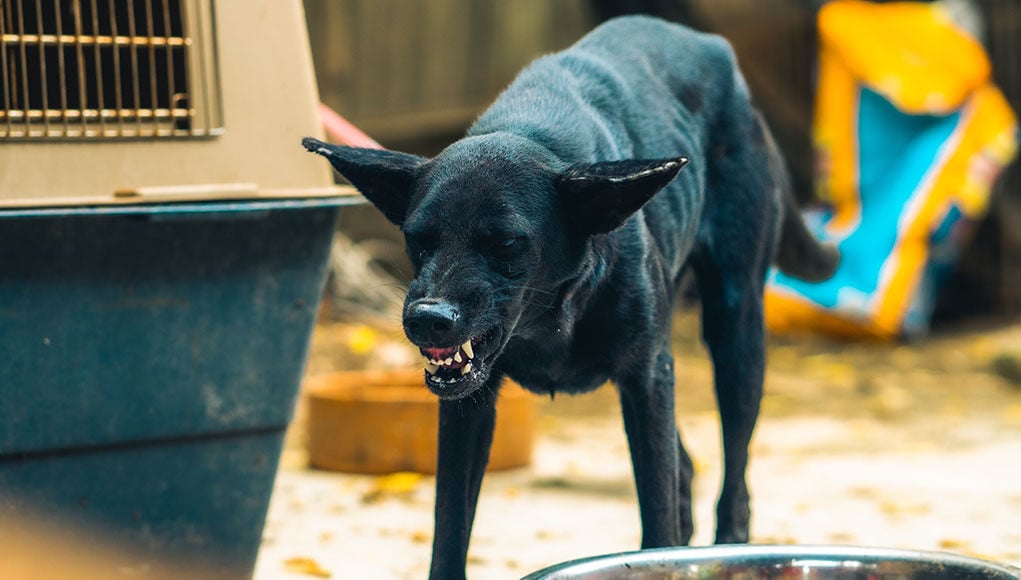Table of Contents
Have you noticed sudden behavior changes in your senior dog? Have they become suddenly aggressive? Well, aggression in dogs with dementia is common.
Aggression can be a reaction for dogs who are experiencing, pain, discomfort, and confusion.
And sadly, this can also be a symptom of Dementia or Canine Cognitive Dysfunction Syndrome.
So do all dogs with dementia tend to be aggressive over time?
In this article, we'll discuss everything you'll need to know about why dogs with dementia exhibit aggression over time.
But before that, let's first discuss what is dog dementia.

Dog Dementia Aggression
Canine Cognitive Dysfunction Syndrome or known as CDS is a progressive condition in dogs wherein physical and behavioral changes over time due to dementia.
Along with these, neurological functions also degenerate. Dogs may even experience memory loss.
All dogs may have dementia, especially dogs who are old. Especially dogs who have exceeded more than 10 years of age.
When dogs are diagnosed with dementia, dogs may begin displaying aggression as well.
This can be due to memory loss, metabolic changes, bodily dysfunction, and other reason as well.
Dog dementia aggression can become their coping mechanism for these sudden changes.
Dogs with dementia can be aggressive with their owner and family as well.
Other pets in the household may also experience unwelcome greetings from the dog. This can also occur with visitors severely.

Symptoms of Dog Dementia
Furthermore, if you're still unsure whether your dog has dementia, we've listed down the possible signs that you can look into.
You know your pet better than anyone. If ever you've noticed any unusual behavior or the symptoms below, it's best advised to contact your vet immediately.
According to Dr. Denise Petryk, DVM, the DISHA is a widely accepted acronym that can help pet owners indicate the most common signs of dementia in dogs.
DISHA means:
- Disorientation
- Interaction Changes
- Sleep-wake Cycle Disruptions
- House Soiling
- Activity Changes
Moreover, Dementia or Cognitive Dysfunction Syndrome and other diseases may have similar symptoms that may be hard to differentiate.
Along with aggression, here are some other signs one must look out for:
- Aggression towards the owner and members of the household
- Aggression towards other pets in the household
- Impulsive biting
- Anxious or Disoriented—become clueless about the usual things
- Repetitive behaviors
- Zoning out for long periods
- Not engaging with wonder, families, or other pets in the household
- Becomes timider and more vigilant
- Barking for no reason
- Circadian rhythm changes
- Appetite changes
- Defecating and urinating inside the house
- Declining in health
Causes of Dementia in Dogs
Dementia in dogs still does not have a definite cause. Although old age may also be a factor in dementia with declining bodily functions.
Along with the age increasing, there is a decrease in cell quality. The body does not generate the same quality of cells as they age.
Researchers have found that along with the disruption of the neurotransmitters in the brain due to monoamine oxidase B (MOAB) buildup, the transmission of nerves was also disrupted due to abnormal buildups of beta-amyloid (a kind of protein) in the brain.
There are similarities between Alzheimer's and Canine Cognitive Dysfunction that scientists are currently researching on.
In hopes that treatment for both conditions may be similar and discovered.
In both conditions, aggression often is a result due to disorientation, anxiety, and discomfort due to pain with how the body and mind are working.
Not only that, the memory is beginning to be fragmented but also the body functions are declining as well.
Even with humans who experience, aggression is often seen as a symptom. It is related to confusion and uneasiness.
Because these patients have cloudy memory, they tend to feel unsafe and unfamiliar with their surroundings.
Therefore, the patients use aggression as a coping mechanism for these situations.

Diagnosis for Aggression in Dogs with Dementia
Dogs who have Dementia and Cognitive Dysfunction Syndrome may undergo diagnosis and consultations for further evaluation of their conditions.
Diagnosis may help with the necessary treatment and guidance needed. Here are the following diagnostics the dog may need:
Consultation & Physical Evaluation
It is advisable to undergo a thorough physical evaluation with the veterinarian.
This can help the veterinarian evaluate any physical and behavioral changes and consider what symptoms are present or may occur in the future.
Computerized Tomography (CT Scan )
PET/CT can also be used for the diagnosis of dogs suspected to have Dementia or Cognitive Dysfunction Syndrome.
CT Scans often have biomarkers that can help medical technicians differentiate types of syndromes or diseases.
Magnetic Resonance Imaging (MRI)
Veterinarians may request an MRI scan for dogs suspected of Cognitive Dysfunction Syndrome.
The MRI result may show physical changes in the dog’s condition such as shrinking of the brain.

Treatment for Aggression in Dogs with Dementia
Dogs with dementia will progressively lose their accustomed and familiarized consciousness and awareness.
Remember, their aggressiveness is the result of these changes and as owners, it is our responsibility to help and guide our pets.
Although there is no definite prevention and treatment, here are some ways that may help the dog with dementia:
Oral/ Injected Medication
If the dog is displaying overwhelmingly aggressive activities or behaviors, owners may ask their veterinarians for assistance and guidance as well.
The veterinarian may recommend administrating a medication that may help calm the dog’s temper.
Selegiline with brand names: Anipryl®, Eldepryl®, Selgian®, and Zelapar® is one of the most common medications for treating canines and felines with Dementia or Cognitive Dysfunction Syndrome.
Supplements
Supplements can also help decline or alleviate symptoms of Cognitive Dysfunction Syndrome.
Vitamins, Omega-3 fatty acids, melatonin, and other supplements may help cognitive function for some dogs.
It may be hard administrating the supplements when they’re aggressive at the moment but owners may slip the supplements through their water or food.
Improving the Quality of Live
Unfortunately for our pets experiencing Dementia or Cognitive Dysfunction Syndrome, their quality of life is being challenged by the increasing symptoms they have.
One way to help these pets is to improve their quality of life.
This may mean adjusting their diet to more brain and memory-helpful choices, slowly engaging in mentally stimulating activities, spending more quality time and, of course, being patient and understanding to them as well.
Aggression happens due to the overwhelming changes in their cognitive function and memory.
Helping and guiding is our way to help them through these times.
Providing our pets with some routine they can adjust to can help them retain their awareness and consciousness about their surroundings.
Less Stressful Environment
As owners get aware of their dog’s condition, it’s best to prevent stressing out their dogs. This can help them become less vigilant and anxious about their surroundings.
If they feel safer in their space, they’ll likely react less aggressively. Providing a calm and safe environment for them can make them feel more comfortable and relaxed.
Owners can place their dogs in areas away from loud noises, strangers and unfamiliar visitors, and other pets that they may be uncomfortable with.
This can prevent any violent accidents occur. Owners should also consider the comfort of their dog and other pets.
Frequently Asked Questions
Are dogs scared when they have dementia?
Often dementia can confuse your dog due to declining memory, which can make the dog feel unsafe and uncomfortable.
Thus, it can make them feel afraid of the things they may have lost their memory with.
Why is my senior dog becoming aggressive?
For senior dogs with sudden behavior changes, it’s best to consult with your veterinarian regarding this.
This may be a symptom of diseases that the dog is experiencing at the moment.
The senior dog may be experiencing pain due to the underlying condition or may be beginning to have memory decline.
What can I give my dog with aggression?
Owners may consult with their veterinarians regarding medications their dogs may take if they are aggressive.
Anafranil, Clomicalm, and Buspirone can be one of the medications the veterinarian may recommend.

Aggression in Dogs with Dementia: Summary
Aggression in dogs with dementia may be dangerous if it comes to the point where the owners, families, strangers, and other pets or animals are harmed.
If owners encounter such instances, it’s best to contact the veterinarian for advice and necessary medication.
Dog dementia, also known as Canine Cognitive Dysfunction is a condition in dogs similar to Alzheimer's disease in humans.
By the age of 15, about 68% of dogs get dementia with the risk increasing by 50% every year.
Unfortunately, dogs that are suffering from dementia can begin exhibiting aggression even toward their owners. A few reasons can be memory loss, metabolic changes, and more.
If dogs with dementia become aggressive suddenly, consult with the veterinarian and take precautionary measures.













